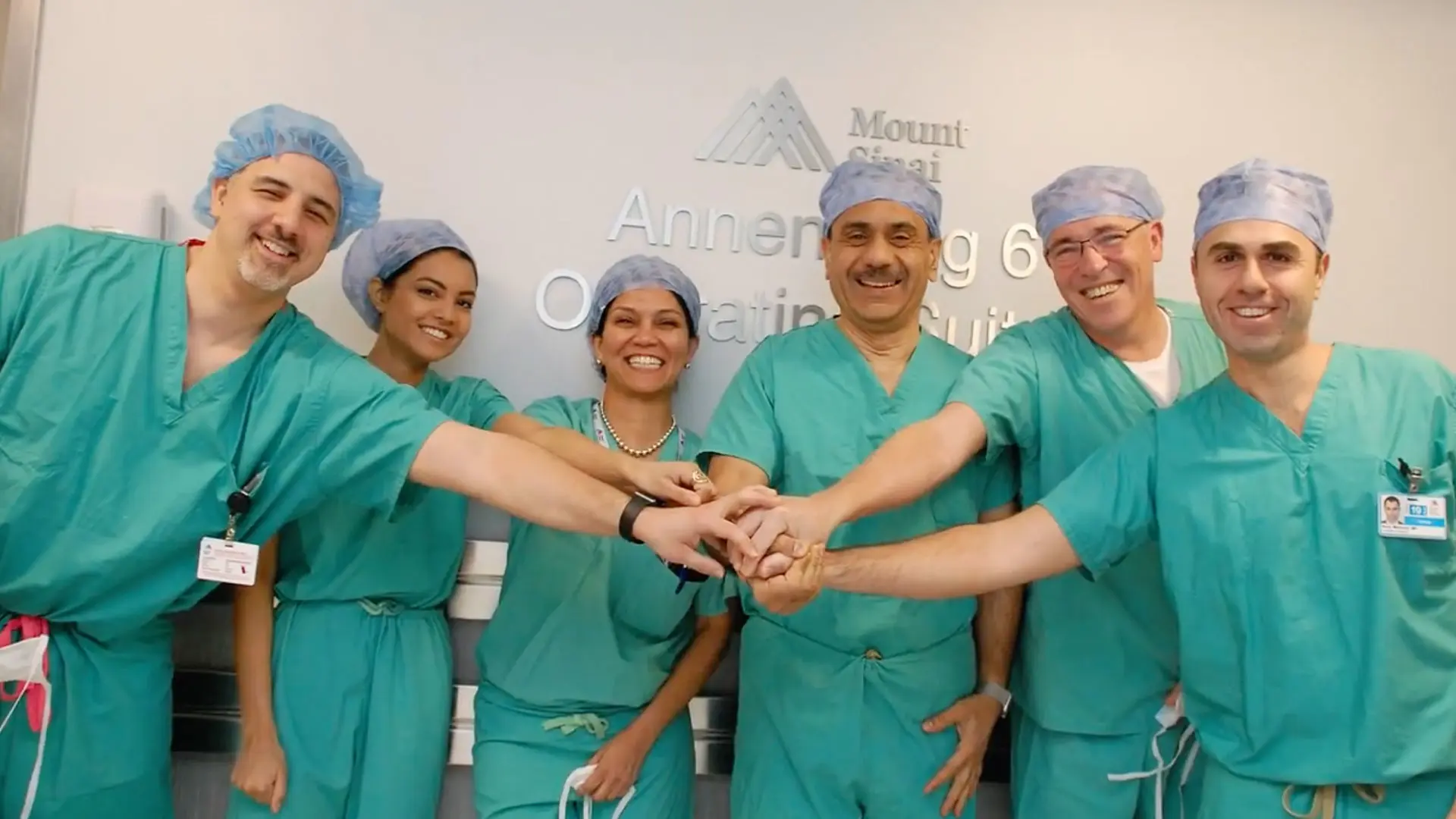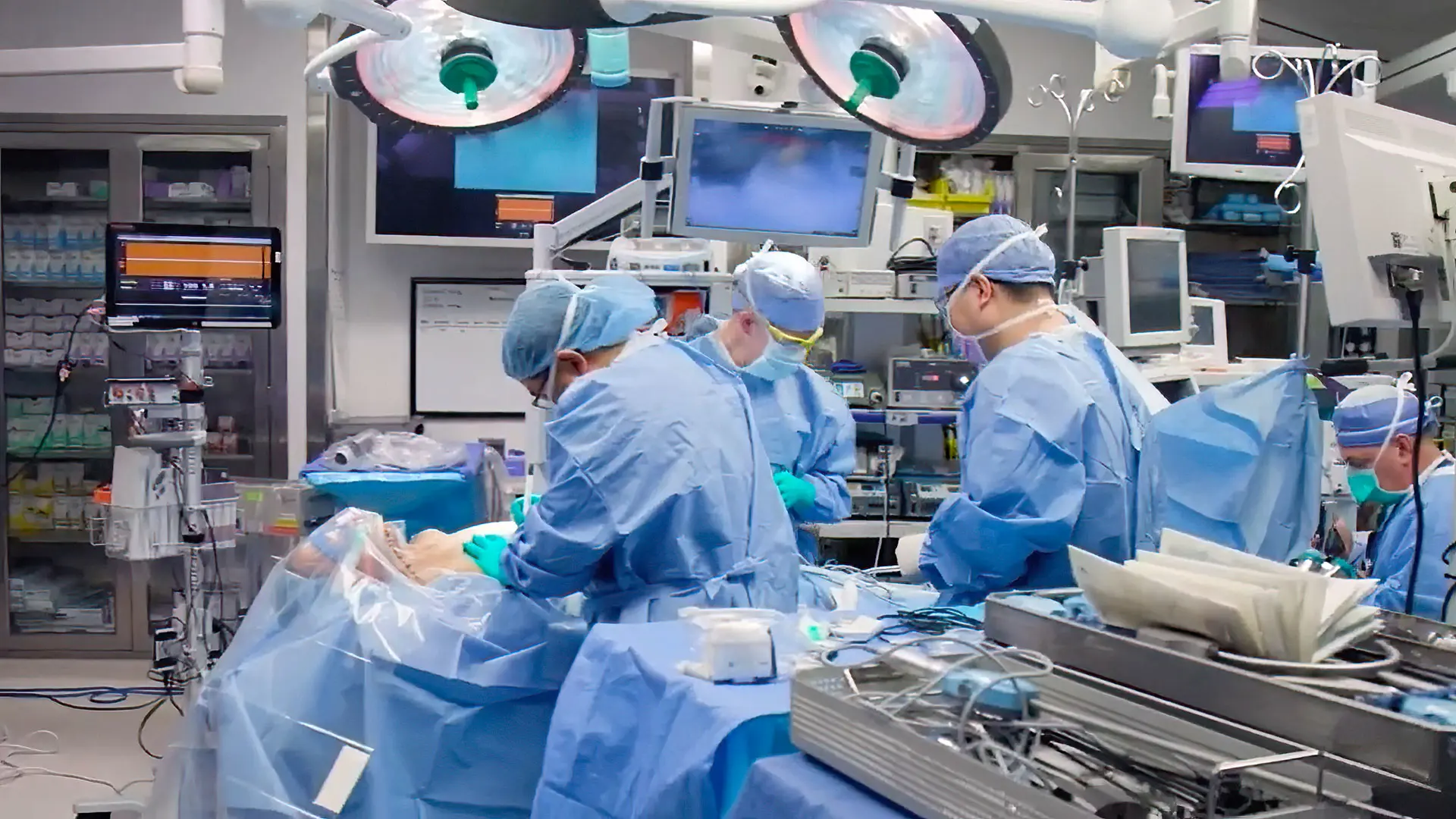In this video, the team at the Department of Urology discuss the success of Mount Sinai’s Bladder Cancer Program.
A team at the Department of Urology recently performed the 500throbotic cystectomy in Mount Sinai’s Bladder Cancer Program, a significant milestone that underscores innovations in patient care, research, and clinical excellence that make Mount Sinai’s program a leader in the field.
A critical point in the evolution of the robotic program occurred five years ago when Ash Tewari, MBBS, MCh, Chair of the Milton and Carroll Petrie Department of Urology, hired Peter Wiklund, MD, PhD, as Director of the Bladder Cancer Program at the Mount Sinai Health System. Dr. Wiklund, a world-renowned surgeon who pioneered robot-assisted cystectomy, had been Chair of Urology, Molecular Medicine, and Surgery, and Professor of Urology at the Karolinska Institutet in Stockholm, Sweden, where he built a leading cystectomy program.
When Dr. Wiklund joined Mount Sinai, the Department was performing about 50 robotic cystectomy procedures per year. Now it is conducting each year about 120 robotic, radical cystectomy surgeries with intracorporeal urinary diversion, and that number is expected to continue growing.
This means Mount Sinai’s program is one of the top programs in the United States in terms of number of procedures, as well as in outcomes, notably lower mortality rates and fewer hospital readmissions, both below national averages, according to Dr. Wiklund. Other key reasons for success include a focus on working before and after the surgery to optimize outcomes; on continuous adherence to protocols; on publishing results; and on overcoming a number of hurdles while ensuring safety.
“These are the most complex cases, so there was a lot of work to get all of these pieces into place, but now I think it’s running very smoothly,” says Dr. Wiklund, who is also Professor of Urology at the Icahn School of Medicine at Mount Sinai. “We now have the busiest program of its kind in the United States, and one of the busiest in the world.”

A team at the Department of Urology recently performed the 500th robotic cystectomy in Mount Sinai’s Bladder Cancer Program, a significant milestone that underscores innovations in patient care, research, and clinical excellence that make Mount Sinai’s program a leader in the field.
Mount Sinai is one of the few institutions in the United States that focuses on performing this procedure exclusively with a minimally invasive approach, according to John Sfakianos, MD, Associate Professor of Urology and Urologic Oncology at Icahn Mount Sinai.
“We've done a lot over the last five to 10 years to help minimize complications and improve patient outcomes from surgery,” he says. “We are also working to improve the science and learning from our experience with bladder cancer to make the future brighter for our patients.”
Key elements that make up Mount Sinai’s approach include:
Performing this procedure without narcotics: Ninety percent of patients will not use any opioids while they are in the hospital or during their recovery, a significant accomplishment made possible with the help of the team’s anesthesiologists who have helped to perform nerve blocks. This has also decreased the risk and rates of ileus.
Working with infectious disease experts: The team tailored an antibiotic regimen that has decreased infection rates to about 10 percent, which is very low compared to the general population of patients who undergo this type of procedure.
Collaborating with colleagues in geriatrics: The team offers special assistance to older patients who may be more frail. This collaboration helps the team select patients who should undergo surgery or who should consider other treatments. It also helps the team to care for patients before and after the procedure, especially with other medical comorbidities they may have.
Working closely with medical oncology colleagues: The team has developed a cohesive, multidisciplinary approach to help identify if chemotherapy is a better first option than surgery, which includes working with Matthew Galsky, MD, Professor of Medicine (Hematology and Medical Oncology), Co-Director of the Center of Excellence for Bladder Cancer at The Tisch Cancer Institute.
Working closely with Mount Sinai researchers: Mount Sinai has a large translational program focusing on both muscle-invasive and non-muscle-invasive bladder cancer, which has helped to identify treatments. Mount Sinai was recently awarded a large grant to perform a clinical trial on a combination of immunotherapies that was discovered at Mount Sinai that could start by the end of 2023.

One important element of the program at Mount Sinai has been how the team that Peter Wiklund, MD, PhD, created works together.
Reza Mehrazin, MD, Associate Professor of Urology at Icahn Mount Sinai, says Mount Sinai’s program offers many benefits to patients who may have no other options.
“Being able to offer this complicated surgery robotically allows patients to have a quicker recovery. From randomized trials and from many studies, we know that there's less blood loss, less pain, less use or narcotics, which translates to getting back to a baseline, being able to eat, a day or two sooner,” Dr. Mehrazin says. “Recent randomized data have shown that there is lesser readmission to the hospital for patients who undergo robotic surgery. All of this is without compromising any oncological outcome, which is very important for these patients.”
Another important element of the program at Mount Sinai has been how the team Dr. Wiklund created works together.
“When a patient comes to us, we are able to offer them a team with more than half a century of expertise,” says Prachee Pathak, PA. “We have spent a lot of time thinking about patients and refining a procedure, doing it well, and then doing it over and over and over again. So you have the best possible outcomes. This is a tenacity and obsession with the pursuit of excellence that we're able to offer our patients.”
Added Dr. Sfakianos: “We've done a very good job of being able to critique ourselves, collect and review our data, and make sure we're doing what's right for patients. The team approach that we've put together is extremely important. This is a huge milestone for us and, in the next five years, we hope we can reach 1,000 surgeries.”